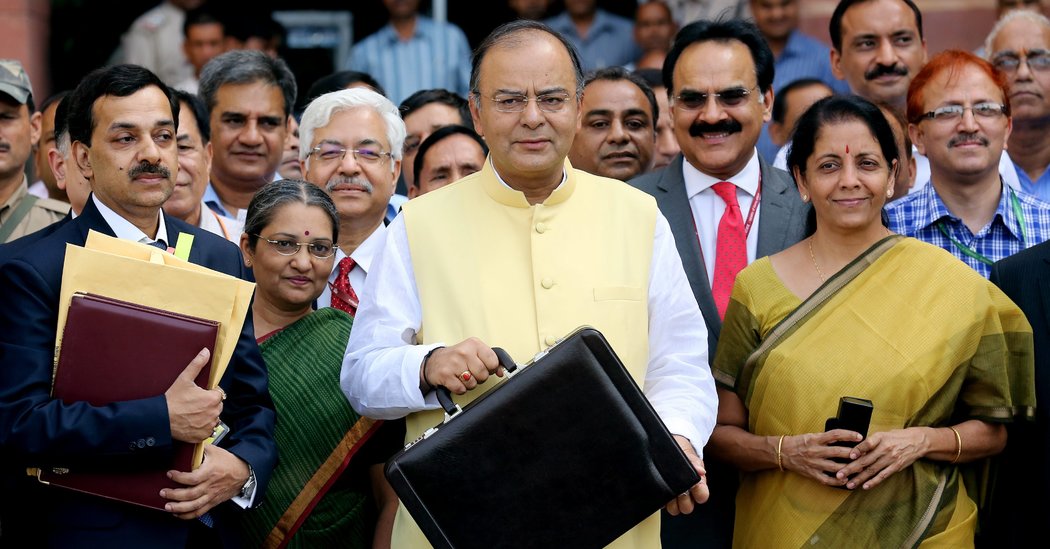NEW DELHI — Arun Jaitley, who as finance minister of India under Prime Minister Narendra Modi oversaw some of the country’s boldest economic experiments and earned respect and trust across a fractured political landscape, died here on Saturday. He was 66.
The All India Institute of Medical Science announced his death there in a brief statement, without specifying the cause. Mr. Jaitley had been ill for several years.
A lawyer by training, Mr. Jaitley was a versatile member of the Hindu nationalist Bharatiya Janata Party, known as the B.J.P., and served senior roles in India’s finance, defense and law ministries. As finance minister during Mr. Modi’s first term, he presided over the invalidation of nearly all of India’s paper currency in 2016, a sweeping if ultimately unsuccessful attempt to crack down on illegal cash transactions.
He cultivated a reputation for openness. As the party’s leadership pinched off the news media’s access to the government, Mr. Jaitley continued to grant interviews to journalists, though some said he traded tips for favorable coverage. He ingratiated himself with varied sections of India’s intelligentsia and befriended strangers during morning walks in Lodhi Garden, a park of crumbling medieval tombs in central Delhi.
Friends described him as a bon vivant and a generous colleague who once paid to have apartments built for secretaries at his law practice. Jairam Ramesh, a member of the leading opposition Indian National Congress party, called him “every non-B.J.P. person’s favorite B.J.P.-ite.”
Shashi Tharoor, a friend and opposition leader, wrote in a column in the Indian magazine Outlook, “His talent for conciliation and comradeship, transcending ideologies and political loyalties, will be sorely missed in our increasingly polarized politics.”
Arun Jaitley was born on Dec. 28, 1952, in New Delhi. His father, Maharaj Kishen Jaitley, was a lawyer, and his mother, Ratan Prabha, was a homemaker.
While studying law at Delhi University in the 1970s, Mr. Jaitley immersed himself in politics, becoming a youth leader of the Akhil Bharatiya Vidyarthi Parishad, the student wing of the Rashtriya Swayamsevak Sangh, a far-right Hindu nationalist organization.
He was profoundly affected by the era’s turbulent politics, including the 21-month period between 1975 and 1977 when Prime Minister Indira Gandhi declared a state of emergency and crushed dissent by arresting scores of opponents and shutting down the news media. Shortly after that declaration, Mr. Jaitley, then 22, and other student protesters burned an effigy of Mrs. Gandhi.
For his involvement in that protest, he was arrested and eventually taken to Tihar Jail in New Delhi, a prison packed beyond capacity with political dissidents. He was detained for 19 months.
In an interview for the 2015 book “The Emergency: A Personal History,” by Coomi Kapoor, Mr. Jaitley said he kept busy by reading “underground literature” and listening to BBC News on a transistor radio.
“Jail is a state of mind,” he said. “If you are too upset about your position you would get depressed and demoralized and have hair loss and other traumatic experiences. If you were young and thinking of fighting the emergency you felt fine.”
After his release, Mr. Jaitley joined the Jan Sangh, which became the B.J.P. in 1980. He practiced law in India’s Supreme Court and the Delhi High Court. He investigated some of India’s biggest cases, including the Bofors scandal, which involved a major arms contract between India and Sweden and the payment of kickbacks to Indian politicians.
He also struck up a close friendship with Mr. Modi, who went on to serve as chief minister of the state of Gujarat. When Mr. Modi was implicated in the 2002 religious riots in which 1,000 people were killed, Mr. Jaitley vouched for him and helped persuade the prime minister, Atal Bihari Vajpayee, not to remove him from his post.
As finance minister in Mr. Modi’s government, Mr. Jaitley rolled out some of the most consequential economic measures since India opened its markets in 1991. Among them was the Goods and Services Tax, which aimed to streamline India’s overlapping federal and state taxes under a single economic zone, though economists said enforcement was disorganized and crippled many small businesses.
Mr. Jaitley’s health had deteriorated in recent years. He underwent gastric bypass surgery and a kidney transplant. He struggled to manage severe diabetes and was treated for a form of connective tissue cancer this year, Indian media outlets reported. He was admitted to the All India Institute of Medical Science this month for “breathlessness” and later placed on life support.
He is survived by his wife, Sangeeta, and their two children, Sonali and Rohan.
After Mr. Modi was re-elected in a thundering victory in May, Mr. Jaitley announced that he would not take up another post in the government because of his health. In a letter addressed to Mr. Modi, he called it a “great honor” to serve India.
“I could not have asked for more,” he wrote.

